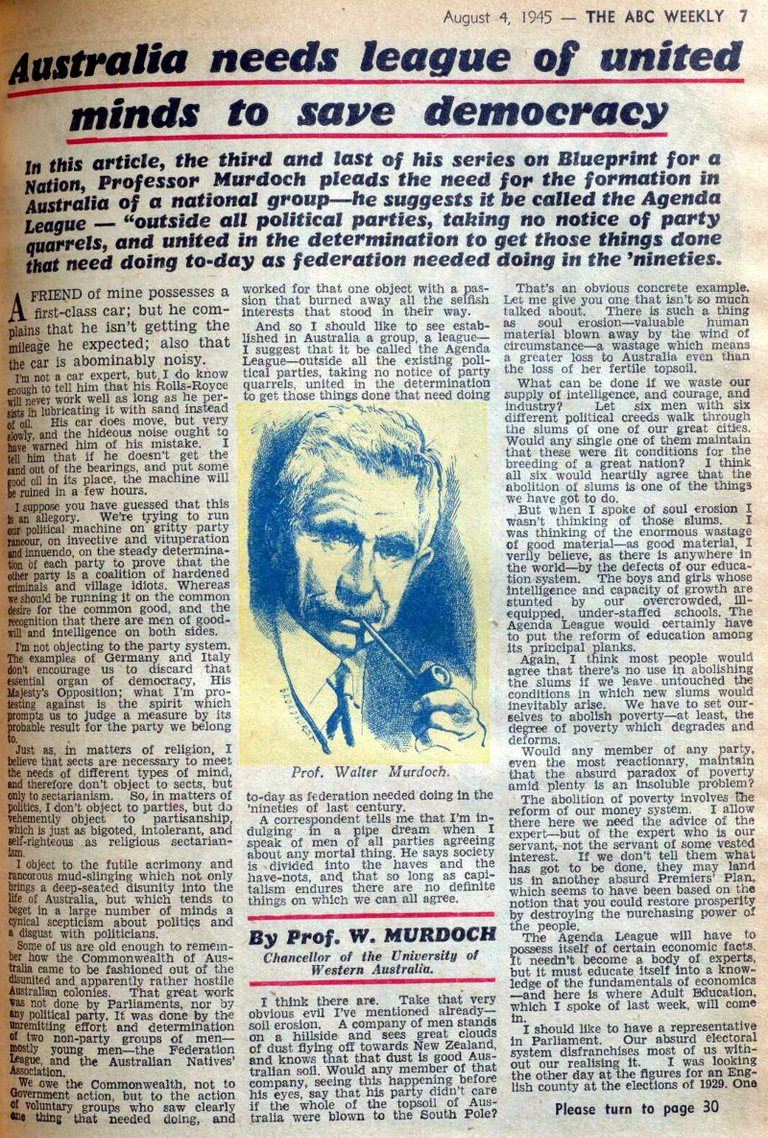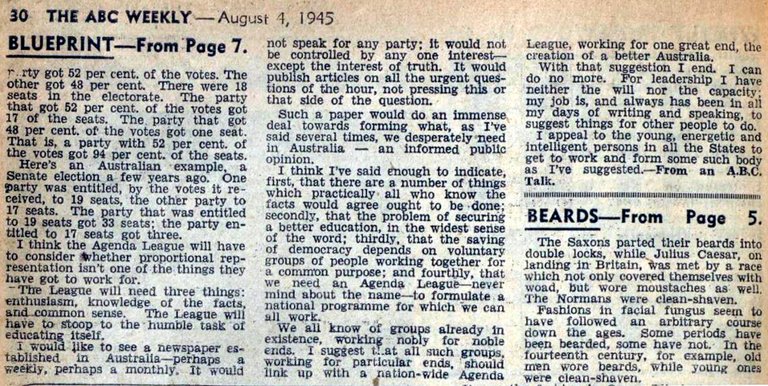Blueprint For A Nation by Prof. Walter Murdoch - 3rd Article
Blueprint For A Nation - Third article in The ABC Weekly, 1945
A series of three articles written by Professor W. Murdoch (Chancellor of the University of Western Australia) on the nature of Australia and its future relations to Democracy. These three articles and an introductory editorial were published in The ABC Weekly Journal way back in 1945.

Blueprint For a Nation - Third & Final Article
By Professor W. Murdoch (Chancellor of the University of Western Australia)
(August 4, 1945 - The ABC Weekly)
Australia needs league of united minds to save democracy
In this article, the third and last of his series on Blueprint for a Nation, Professor Murdoch pleads the need for the formation in Australia of a nation group - he suggests it be called the Agenda League - "outside all political parties, taking no notice of party quarrels, and united in the determination to get those things done that need doing to-day as federation needed doing in the 'nineties.'"
A FRIEND of mine possesses a first-class car; but he complains that he isn’t getting the mileage he expected; also that the car is abominably noisy.
I'm not a car expert, but, I do know enough to tell him that his Rolls-Royce will never work well as long as he persists in lubricating it with sand instead of oil. His car does move, but very slowly and the hideous noise ought to have warned him of his mistake. I tell him that if he doesn’t get the sand out of the bearings, and put some good oil in its place, the machine will be ruined in a few hours.
I suppose you have guessed that this is an allegory. We're trying to run our political machine on gritty party rancour, on invective and vituperation and innuendo, on the steady determination of each party to prove that the other party is a coalition of hardened criminals and village idiots. Whereas we should be running it on the common desire for the common good, and the recognition that there are men of good will and intelligence on both sides.
I'm not objecting to the party system. The examples of Germany and Italy don't encourage us to discard that essential organ of democracy, His Majesty’s Opposition: what I'm protesting against is the spirit which prompts us to judge a measure by its probable result for the party we belong to. Just as, in matters of religion, I believe that sects are necessary to meet the needs of different types of mind, and therefore don't object to sects, but only to sectarianism. So, in matters of politics, I don't object to parties, but do vehemently object to partisanship, which is just as bigoted, intolerant, and self-righteous as religious sectarianism.
I object to the futile acrimony and rancorous mud-slinging which not only brings a deep-seated disunity into the life of Australia, but which tends to beget in a large number of minds a cynical scepticism about politics and a disgust with politicians.
Some of us are old enough to remember how the Commonwealth of Australia came to be fashioned out of the disunited and apparently rather hostile Australian colonies. That great work was not done by Parliaments, nor by any political party. It was done by the unremitting effort and determination of two non-party groups of men — the Federation League, and the Australian Natives’ Association.
We owe the Commonwealth, not to Government action, but to the action of voluntary groups who saw clearly one thing that needed doing, and worked for that one object with a passion that burned away all the selfish interests that stood in their way.
And so I should like to see established in Australia a group, a league -- I suggest that it be called the Agenda League -- outside all the existing political parties, taking no notice of party quarrels, united in the determination to get those things done that need doing to-day as federation needed doing in the 'nineties of last century.
A correspondent tells me that I'm indulging in a pipe dream when I speak of men of all parties agreeing about any mortal thing. He says society is divided into the haves and the have-nots, and that so long as capitalism endures there are no definite things on which we can all agree.
I think there are. Take that very obvious evil I've mentioned already -- soil erosion. A company of men stands on a hillside and sees great clouds of dust flying off towards New Zealand and knowns that that dust is good Australian soil. Would any member of that company, seeing this happening before his eyes, say this his party didn't care if the whole of the topsoil of Australia were blown to the South Pole?
That's an obvious concrete example. Let me give you one that isn’t so much talked about. There is such a thing as soul erosion — valuable human material blown away by the wind of circumstance — a wastage which means a greater loss to Australia even than the loss of her fertile topsoil.
What can be done if we waste our supply of intelligence, and courage, and industry? Let six men with six different political creeds walk through the slums of one of our great cities.
Would any single one of them maintain that these were fit conditions for the breeding of a great nation? I think all six would heartily agree that the abolition of slums is one of the things we have got to do.
But when I spoke of soul erosion I wasn't thinking of those slums. I was thinking of the enormous wastage of good material — as good material, I verily believe, as there is anywhere in the world — by the defects of our education system. The boys and girls whose intelligence and capacity of growth are stunted by our overcrowded, ill-equipped under-staffed schools. The Agenda League would certainly have to put the reform of education among its principal planks.
Again, I think most people would agree that there’s no use in abolishing the slums if we leave untouched the conditions in which new slums would inevitably arise. We have to set ourselves to abolish poverty — at least, the degree of poverty which degrades and deforms.
Would any member of any party, even the most reactionary, maintain that the absurd paradox of poverty amid plenty is an insoluble problem?
The abolition of poverty involves the reform of our money system. I allow there here we need the advice of the expert — but of the expert who is our servant, not the servant of some vested interest. If we don’t tell them what has got to be done, they may land us in another absurd Premiers’ Plan, which seems to have been based on the notion that you could restore prosperity by destroying the purchasing power of the people.
The Agenda League will have to possess itself of certain economic facts. It needn't become a body of experts, but it must educate itself into a knowledge of the fundamentals of economics — and here is where Adult Education, which I spoke of last week, will come in.

I should like to have a representative in Parliament. Our absurd electoral system disfranchises most of us without our realising it. I was looking the other day at the figures for an English county at the elections of 1929. One party got 52 per cent of the votes. The other got 48 per cent. There were 18 seats the electorate. The party that got 52 per cent of the votes got 17 of the seats. The party that got 48 per cent. of the votes got one seat. That is, a party with 52 per cent of the votes got 94 per cent of the seats.
Here’s an Australian example, a Senate election a few years ago. One party was entitled, by the votes it received, to 19 seats, the other Party to 17 seats. The party that was entitled to 19 seats got 33 seats: the party entitled to 17 seats got three.
I think the Agenda League will have to consider whether proportional representation isn’t one of the things they have got to work for.
The League will need three things: enthusiasm, knowledge of the facts, and common sense. The League will have to stoop to the humble task of educating itself.
I would like to see a newspaper established in Australia — perhaps a weekly, perhaps a monthly. It would not speak for any party: it would not be controlled by any one interest — except the interest of truth. It would publish articles on all the urgent questions of the hour, not pressing this or that side of the question.
Such a paper would do an immense deal towards forming what, as I've said several times, we desperately need in Australia — an informed public opinion.
I think I've said enough to indicate, first, that there are a number of things which practically all who know the facts would agree ought to be-done; secondly, that the problem of securing a better education, in the widest sense of the word; thirdly, that the saving of democracy depends on voluntary groups of people working together for a common purpose; and fourthly, that we need an Agenda League — never mind about the name — to formulate a national programme for which we can all work.
We all know of groups already in existence, working nobly for noble ends. I suggest that all such groups, working for particular ends, should link up with a nation-wide Agenda League, working for one great end, the creation of a better Australia.
What that suggestion I end. I can do no more. For leadership I have neither the will nor the capacity; my job is, and always has been in all my days of writing and speaking, to suggest things for other people to do.
I appeal to the young, energetic and intelligent persons in all the States to get to work and form some such body as I've suggested. -- From an A.B.C. Talk
Congratulations @n0m0refak3n3ws! You have completed the following achievement on the Hive blockchain And have been rewarded with New badge(s)
Your next target is to reach 50 posts.
You can view your badges on your board and compare yourself to others in the Ranking
If you no longer want to receive notifications, reply to this comment with the word
STOP